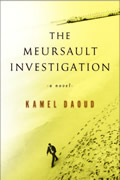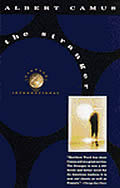
 I wanted to read Kamel Daoud’s The Meursault Investigation the moment i saw it advertised. However, I knew I had to reread The Stranger first. I hadn’t touched the book for decades, had not been thrilled by it the first time around, so was thinking I’d had enough learning under my belt to appreciate it by now. Expectations partly fulfilled.
I wanted to read Kamel Daoud’s The Meursault Investigation the moment i saw it advertised. However, I knew I had to reread The Stranger first. I hadn’t touched the book for decades, had not been thrilled by it the first time around, so was thinking I’d had enough learning under my belt to appreciate it by now. Expectations partly fulfilled.


I guess I’m a bit of a heretic about this, daring a critical comment about a Nobel prize-winner but I think the novel is more of a philosophical treatise than a literary triumph. I’ll give it to Camus that he created a somewhat compelling story despite the fact that his protagonist’s core emotion is indifference and confusion. Furthermore, it’s that indifference and detachment–specifically over his mother’s death–that leads to his conviction. The death of the anonymous “Arab” he shot seldom enters into the deliberations. Just as lacking is any real motive for Meursault to commit the crime. All of which, if I’m not completely off base. is Camus’ way of declaring in his existential or absurdist way that the what happens is what happens, that there’s no logic or order to it, and there’s no use pretending otherwise.
In many ways, Daoud’s novel is the more interesting of the two, though Investigation would not exist without Stranger. Part of Camus method for creating his random, impersonal universe is to leave the victim of the crime nameless. Investigation is all about giving the victim an identity.
Daoud’s structure creates a wonderfully multi-layered narrative that results in rich melodic and harmonic point-counterpoint. The entire storytelling takes place in an Algerian bar, and is spread over several days/evenings. Lots of wine flows. The narrator is the brother of victim–his name was Musa–and he’s telling his brother’s story, speaking “in the place of a dead man,” to a young university student who has come to recover the truth of the incident. The student is nameless, and the only suggestion that he/she speaks is when the narrator, an old man now, answers a question we never hear. Add to the mix a deaf-mute eavesdropper, also unnamed, and an opening sentence that implies a bridge to Camus’ book–“Mama’s still alive today”–and you right off have a novel with wealth of dimension.
The narrator, of course, has conducted his own investigation of his brother’s death over the years. He’s visited the scene, tried to find witnesses, read and reread The Stranger for clues. He recounts how his mother sought to use him to replace his older brother. Dressed him in his brother’s clothes. Gave him a nickname that tied him to his brother. He tells about his mother’s own investigation. How she tucked into her bosom the newspaper clipping that reported the murder, went from town to town, house to house (the narrator tagging along of necessity) trying to find out not only more about what happened but, indeed, the corpse itself. Even that has disappeared, its vanishing strengthening his mother’s need to replace the older brother with the younger.
Thus, there are at three investigations going on, and the narrator implies that there have been more. All ind addtiion to the original police investigation, of course, which didn’t amount to much. Along the way, the novel turns into a story more about identity and loss as about the crime. Woven into the narrative is the story of the Algerian revolution and the French surrendering of their North African colony. Meursault was, of course, part of that “Pied Noir” oppressors. (“Pied Noir” meaning “blackfeet.” So called because they wore inappropriate French black shoes even in this desert country.) Thus, both Camus and his protagonist become part of that aspect of the tale.
And I can’t let go unmentioned, Daoud’s playful tricks with language.
“You know how ‘Meursault is pronounced in Arabic? El-Merssoul. … “The messenger.”
or
What does “Meursault” mean? Meurt seul, dies alone? Mwurt sot, dies a fool? Never dies?
Quite and achievement here. You’ll find a great deal of emotional, political, philosophical, and literary truth in The Meursault Investigation, and be mightily entertained along the way.
